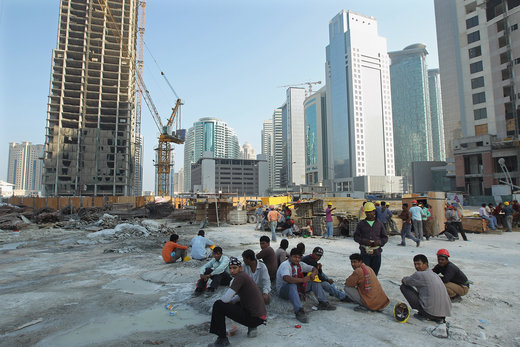4 April 2014
The Chartered Institute of Building (CIOB), an international professional institute for construction management, has decided to hold its annual general meeting and conference in Qatar this year in a bid to pressure authorities to ramp up efforts to protect workers.
The Gulf state is developing rapidly ahead of the 2022 World Cup but has become the focus of allegations of ill-treatment and human rights abuses concerning its large immigrant labour force. More than 500 Indian workers have died in the past two years, the Indian embassy in Qatar has said.
The CIOB, which has just over 46,000 members in more than 100 countries, said it is holding its annual members’ forum and conference there in June in an effort to drive reforms on workers’ welfare.
In an interview with GCR and sister publication, Construction Manager, CIOB chief executive Chris Blythe insisted that the CIOB will not shy away from the issue.
“The CIOB can be part of helping to change things by working with others putting pressure on the Qatari authorities to change the system and to move on from the system they have,” he said.
Senior Qatari figures are scheduled to speak at the conference but Blythe said the CIOB, headquartered in the UK, would offer help rather than just blame.
“We can’t expect them to sit and listen to us rant at them,” he said. “The UK has not been immune from migrant worker abuse. We have our own issues. Remember the cockle pickers in Morecambe Bay? We’re not there to say we’re right and you’re wrong, it’s more to say this isn’t working, what’s the next step?”
He said, however, that the kafala system, whereby a worker is sponsored by their employer who retains control of the worker’s visa and legal status, is too open to abuse.
“The worker can’t change employers or even leave the country without the employer’s permission,” he said. “What rights do workers have in those circumstances? The scope for exploitation is vast.”
“Bear in mind,” he added, “a European expat working at management level in Qatar operates under the same rules, so it’s also about how the system is used.”

Construction workers from Bangladesh take a break in Doha. The CIOB will hold its conference in Qatar this year to press for workers’ rights (Sean Gallup/Getty Images)
Blythe has joined calls for Qatar to cut out unscrupulous labour agents and by putting the government in charge of recruiting and supplying migrant labour.
“It would amount to nationalising the migrant worker business,” he said. “That way you can set out and police things like conditions more easily. But it’s having the will to do it. That’s been tried in Bahrain to a limited degree and there’s no reason it couldn’t work in Qatar.”
The CIOB also supports a charter on the welfare of migrant workers published by the Qatar Foundation in March last year. The Foundation, a non-profit organisation founded in 1995, aims to improve education, science, community life and the arts.
It also commissions new facilities, including campuses of eight international universities. The Foundation now insists that any work commissioned in their name must abide by the standards set out in the charter.
It’s not law, but Blythe says it carries weight. “Qatari Rail, which is building the rail infrastructure, is adopting the principles set out in that document. The principles are quite rigorous, covering everything from working conditions to housing. If you don’t abide by it, you won’t get work with the Qatar Foundation or Qatari Rail.”
CIOB officials met with diplomats at the Qatari embassy in February and received a positive response to their plans.
“We told the chargé d’affaires what our plans were for this conference, who would be attending, and that we were going to be critical of what goes on,” Blythe said. “We wanted them to understand that we couldn’t go there and just ignore it. And they welcomed that.”
Asked if the meeting would generate talk and no action, Blythe admitted it could. However, he said, “If you don’t engage in conversation nothing will happen.
“I think the Qatari government is eager to hear from anybody who can contribute positively to the debate as opposed to just criticising. If you ignore them and say ‘I’m not even getting involved’, don’t expect things to change. That’s a strategy for leaving things as they are. If you’re concerned about the fate of migrant workers, walking away from Qatar is not going to solve the problem.”










